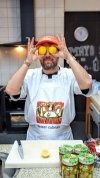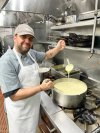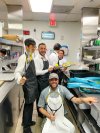






DJ Tennis’ love for music and food grew from the same sense of playful curiousness and determination. Asking questions like desert island album & dish picks, Ana Monroy Yglesias examines the producer-DJ-chef’s relationship to both in this profile for Hii.
"If you do it with passion and you love what you do, it grows… If you do things you like, you want to do them over and over again and perfect them," DJ Tennis recently told us.
"I always say that a DJ and a musician, or a concert or performance, is [about] giving people an experience and part of your vision, you're taking people on a journey. It's not that different [from]with cooking for other people because you want to give them an experience," he continues.

The beloved left-field electronic DJ, producer and label head was born Manfredi Romano in Italy in 1970. He started cooking with his parents at age 10, learning the family recipes and falling in love with the process of making, perfecting and sharing food. When he went to the University of Pisa to study computer science in 1989, he worked as a server, and then as a chef to pay the bills. At the time, he also worked in the storage room of a record shop, where he'd sort vinyl and drive bands around Europe. This led him to managing punk bands, throwing music events, and eventually forming Italy's first electronic music-focused booking agency, DAZE. In 2010, he shifted his focus to DJing and producing music, while simultaneously starting the Life and Death label and events brand.

Romano still loves to cook for friends and family whenever possible, and has integrated cooking into his public offerings, including cooking demonstrations on Twitch during the lockdown, cooking for charity events and private dinners, and teaming up with chefs to bring his music to fine dining experiences. Because of Romano's intimate experience with and love for cooking and DJing, we wanted to explore the links between music and food for him, and how his time in the kitchen influences the sonic journeys he creates as a DJ.
"You have taste and tactile senses and smell on one side and hearing and visual, which can be tactile also when you're enjoying a musical experience in a club or in concert. The environment counts, the people around you make a difference. It's the same with food, you can make a terrible dinner with the right ingredients, and you can do a terrible set with the right music, and vice versa. [Chuckles.]"
He compares producing a track to the process of perfecting a dish by making adjustments each time you make it, until it's just right. He adds that for both, "You also need to have taste and you also need people to like it. If you're making sea urchin with truffle, which is kind of brave, you need to try to make people like it. So if your [music is] experimental, if you're doing something that is weirder, you have to try to get people to like it or think, 'Oh! This is a new thing.' Or, if you make something that is very standard like a disco track for example, you have to make it the best way possible."

In terms of how his time as a chef has influenced the sonic journeys he creates behind the decks, he doesn't feel a direct connection, "It's not that the time I spent in the kitchen influences my sonic craftsmanship or abilities, I think it’s more the attitude and wanting to do better, of perseverance and trying and trying again," the "Repeater" producer reflects. He adds that being a chef "is the hardest job ever," making music production feel like a cakewalk in comparison.
"In the kitchen, I learned to listen to others, but not always. To believe in yourself and experiment with things. Don't always do what other people tell you to do, because formulas are the death of creative process. In the kitchen, you have people yelling at you and you have time limits, so you learn commitment and giving yourself goals and timelines. That's actually what I use in production," he reflects.
A DJ Tennis show is like showing up at a surprise party: you know that it will be fun, but you won't know what the vibe will be until it's happened. No two DJ Tennis sets are ever the same or have much overlap because he never plans them or his tracks in advance, not even for important recorded ones like Boiler Room.
"I need to feel the environment and the crowd… and then I decide how to start. After I start, I just go with the flow. I get bored very easily playing the same music over and over again. Sometimes I play two tracks and I say, "Okay, this is enough of this and I need something completely different" and I try to look for it. I don't know what to expect, as well. I think probably two tracks ahead, no more than that."
In his 2020 Beatportal interview, Romano said “I like to start with a white canvas for every track. I’m not sure if this makes sense, but for me, it works.” Does he also approach cooking in this way, or does he have tried-and-true dishes he always makes? "Of course you have your signature sounds, your signature dishes," Romano says, as he explains that most often cooking involves using what you have on hand and making it work. "That's the way I approach music, I don't think about the destination. The more I enjoy the journey, the process of doing things, I get the best results."

Even as he's cooked it many times and many ways, DJ Tennis sees pasta like a white canvas to work with. Some of his favorite things to cook are fresh pesto, ragù, fish with veggies, and porcini mushroom risotto. He loves cooking with local foods and with friends when he tours, and is starting to slow down his tour schedule a bit so he can spend more time in some of the cities he plays to foster this. He agrees that cooking and making music can be meditative, a useful balm to days spent in and out of clubs and airports.
But when he's on the road with a busy schedule, eating well is a struggle. "Airport food is terrible, it's one of the curses of DJs," he says. "On the flip side… I really feel lucky that I have the chance to taste amazing restaurants." He loves to enjoy the local food as he travels, but admits he's had some good Italian food elsewhere, like a stellar Italian meal in Bangkok recently. He lived in Mexico City for six months during the pandemic and developed a love for insects and the innovative ways they're prepared there, like escamol, which are ant eggs, or caviar, that taste buttery and delicate and are served as tacos.
When asked to pick one food to eat and one album to listen to for the rest of his life, Romano claimed he could easily eat fish until the end of time. The musical selection is an understandably harder choice. It would be Marvin Gaye or The Beatles' Sgt. Pepper's Lonely Hearts Club Band, or Shuggy Otis, Fela Kuti or Tony Allen, something with different moods in it, and rhythm to keep him moving.

As he mused about a fictional future island life with bountiful grilled fish, DJ Tennis recalled a very real and hilarious story of getting stuck in Saint Martin in March 2020, after being the last DJ to play at SXM Festival. Rather than scrambling to catch one of the last flights out into lockdown, he opted to stay on the beach, and ended up with a bunch of weed, which put him in the mood to jam out to endless reggae. The road between the Dutch and French sides of the island was closed, and he was on the former, where the grocery stores were subpar. All he had was time, so he would bike through the hills to sneak over to a French grocery store so he could eat well on his surprise six-week vacation.
Italian filmmaker Federico Fellini declared, “Life is a combination of magic and pasta.” Though he never planned to be a chef or a DJ, Romano found a way to make time for cooking and music and share it with others. As [parmesan] cheesy as it sounds, by following his passions, approaching them with an open mind and enjoying the time spent practicing them–instead aiming for perfection or the next big thing–Manfredi Romano lives an inspired life that makes Fellini’s words ring true.



